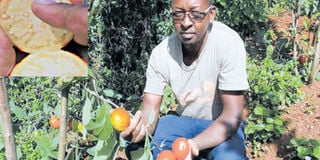The persimmon man

Evanson Waitiki, the farmer from Kagere Village in Nyeri who grows the persimmon fruits (inset). Research shows the fruit contains plenty of dietary fibre and compounds that ward off several diseases. PHOTO | ISABEL GITHAE | NATION MEDIA GROUP
What you need to know:
- He grows the fruit on three acres, having pumped into the business Sh500,000 from his savings.
- To grow the fruit, Waitiki starts with planting the Israeli variety seeds in a bed, which he makes by mixing the soil with animal manure.
- The variety he grows starts to produce fruits in three months, and he begins harvesting two weeks later when they are red.
Evanson Waitiki, a farmer in Kagere village, Nyeri County, has made growing the persimmon fruit his business, and he has no regrets about it.
Waitiki started the agribusiness in 2014 after returning from Dubai, where he worked as a security officer.
“When I returned, I had to look for something worthwhile to do and farming presented me with the opportunity,” he recounts.
He grows the fruit on three acres, having pumped into the business Sh500,000 from his savings.
The money went to installation of water tanks, pipes, labour and seedlings.
“But when I started, persimmon was not my crop of choice. I first experimented with pumpkins, then moved to apples, pepino melons and herbs like mint but they did not do well. A friend introduced me to persimmon.”
To grow the fruit, Waitiki starts with planting the Israeli variety seeds in a bed, which he makes by mixing the soil with animal manure.
“I normaly spread the seeds in the soil, and cover them with a thin layer of soil. I also cover the seedbed with a greenhouse net to protect the seedlings from harsh weather,” he says, noting the seeds sprout after about a week.
He transplants the seedlings to the main farm after a month, planting them in a spacing of four by four feet to allow them to grow spaciously.
CONDITIONS FOR CULTIVATION
He mixes the soil with organic manure and ash. The latter helps to reduce acidity in the soil.
The variety he grows starts to produce fruits in three months, and he begins harvesting two weeks later when they are red.
Waitiki, who has 200 plants, sells the 50kg he harvests in Nyeri town, Othaya and Karatina.
“I harvest after every two weeks and sell a kilo at Sh120,” says the farmer, noting that before venturing into fruit farming, one should do soil test, understand the climatic conditions and pests and diseases.
His biggest challenges Waitiki says are diseases like root rot and when there is a dry spell as the fruit needs irrigation.
Persimmon can be blended with other fruits to make juice, it can be boiled, eaten raw or chopped to make salad.
Research shows it contains plenty of dietary fibre and compounds that ward off several diseases.
John Kiogora, an agronomist at Novixa International, advises persimmon farmers to plant the seeds with enough manure which is well decomposed to keep pests and other diseases that may affect the seedling at bay.
“Plant the seedlings in soil where there is no history of bacterial diseases for better growth.”
However, eating persimmon on an empty stomach or in excess can cause diarrhoea thus the fruit should be consumed in moderate and limited quantity.
Diabetes patients should also eat it in moderate quantities as it contains a high amount of sugar and can elevate blood glucose level.




